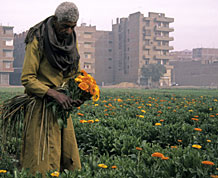BOULAQ EL DAKROUR
Boulaq El Dakrour is the largest informal settlement in the Governorate of Giza with a population of almost 1 million. Residents live in illegally built dwellings on privately-owned agricultural land. Population density is extreme. Streets are narrow and buildings reach 6â8 storeys. There is virtually no open space for the provision of public services and practically no community facilities exist. Residents suffer from environmental pollution, particularly from uncollected and ever accumulating solid waste. Unemployment is estimated at 20%, reaching 50% for those under 20. A lack of trust between stakeholders in the area hinders sustainable development.
Boulaq El Dakrour brings particular strengths to the programme. The local administration and residents are willing to participate in development; young people are particularly engaged. A newly formed NGO Councilâwith membership drawn from NGOs active in the neighbourhoodâprovides a focus for Programme capacity building activities. The Council has become a key stakeholder in the areaâs development.
Projects in Boulaq El Dakrour include:
- Procedural changesâstricter control on the distribution of bread, more transparency in governmental processes, and improved communications between the local authorities and the areaâs residents. 80% of these projects require only procedural changes and are free of cost.
- Infrastructure installation and improvement, including improvements in water supply and sewerage for up to 450,000 inhabitants (financed by BMZ via KfW German Development Bank)
- Rehabilitating or building community facilities such as nurseries, schools, computer centres, health centres, sport centres, pedestrian bridges, and community service centres.
- Youth activities involving local economic development, environmental protection, and awareness raising campaigns.
- Redesigning a fruit and vegetable market and establishing a participatory management scheme for it.
- The programme offers capacity building activities to area NGOs, local government agency staff, the Local Popular Council, and to youth and womenâs groups.
